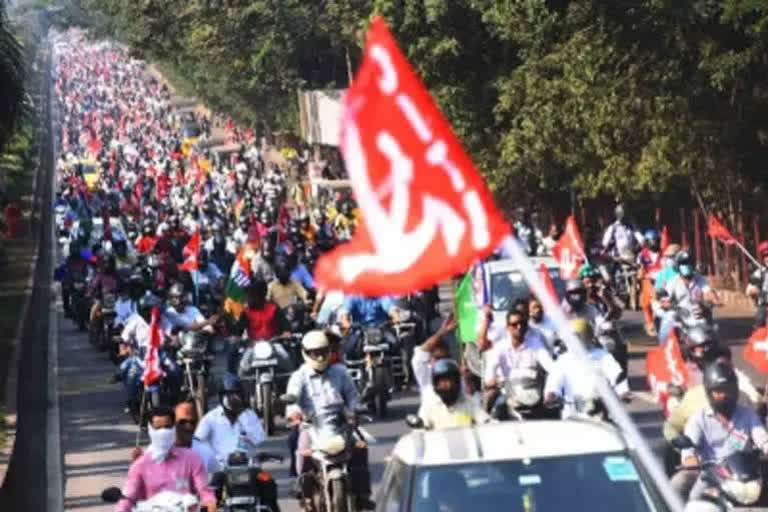New Delhi: The joint platform of Central Trade Unions is planning to launch a bigger movement with the support of Farmer Unions in the coming months as the nationwide general strike by central trade unions concluded on Tuesday. The strike saw a response from the working class of different sectors and from the different sections of society across the country, as claimed by the leaders of the joint platform of Central Trade Unions.
On the second and final day of the general strike call, leaders joined by workers from different sectors gathered at Jantar Mantar in New Delhi to demonstrate against the policies of the Central Government. The trade unions have been protesting with their 12-points demand including the repeal of labour codes, regularisation of contract workers, fixed unemployment compensation, and an old pension scheme.
ETV Bharat talked to Amarjeet Kaur, the General Secretary of All India Centre of Trade Unions (AICTU) who claimed that more than 20 crore people from different sectors and sections participated in the two-day strike. "The message of our movement has reached the government as farmers have also joined the workers in the strike. Rural areas have also observed shutdowns. Those sectors that did not participate in the strike previously have participated this time. Defence and Railway employees though could not participate in the strike but they did support the mobilization of the strike," Kaur said.
"Apart from that, workers from unorganized sector which includes construction, beedi, private transport and head load workers also participated in the strike. ASHA and Mid-Day meal workers have come out in huge numbers to make the movement successful," Kaur added. "We have not only mobilised workers from government sector but have gathered support from job aspirants, unemployed, those who lost their jobs across the sectors.
"This is why we claim the support of more than 20 crore workers in the strike. This is a big signal to Modi Government and they must take cognizance otherwise our movement is going to intensify in the coming days" she added.
Although the Bhartiya Mazdoor Sangh (BMS) did not participate in or support the two-day general strike call, the leaders of Mazdoor Sangh have been vocal against the privatisation of PSUs, certain clauses of the four labour codes and the New Pension Scheme. Meanwhile, the trade unions that participated in the general strike demanded the complete rollback of the labour code whereas the BMS demanded some amendments to the codes.
The General Secretary of All India Centre of Trade Unions said, "We have removed the word privatization and disinvestment because the government is moving towards an economic policy of selling the assets of the country. As far as the labour codes are concerned, the government knew that they will be facing huge resistance from the working class which is why they brought it at a time when the country was going through lockdown due to the Covid-19 pandemic."
"We had asked the government to address issues and not bring these codes but they did not organize a labour conference and later they did not even hold the discussion in the parliament. We were never against changes in labour laws but the government did not consult and presented the anti-labour codes which are not acceptable to the working class," said the General Secretary of AICTU.
She further said that in the new labour codes the government has snatched the right to go on strike and forming a labour union has been made difficult. The new labour codes talk about the de-recognition of trade unions and also there are provisions to arrest and jail the union leaders. Kaur added that the trade unions who are against the labour codes want Indian Labour Conference to be organised where the matter of labour laws to be discussed and then the labour coded be formed.
Meanwhile, the 12 point charter of the Joint platform of central trade unions also includes 6 pending demands of the farmer unions. It is speculated that it is an attempt of central trade unions to involve the joint platform of farmer unions, Samyukt Kisan Morcha, actively in the Trade Union's Movement so that they can build maximum pressure on the government as a joint force.
Also read: Nationwide strike of trade unions enters second day



